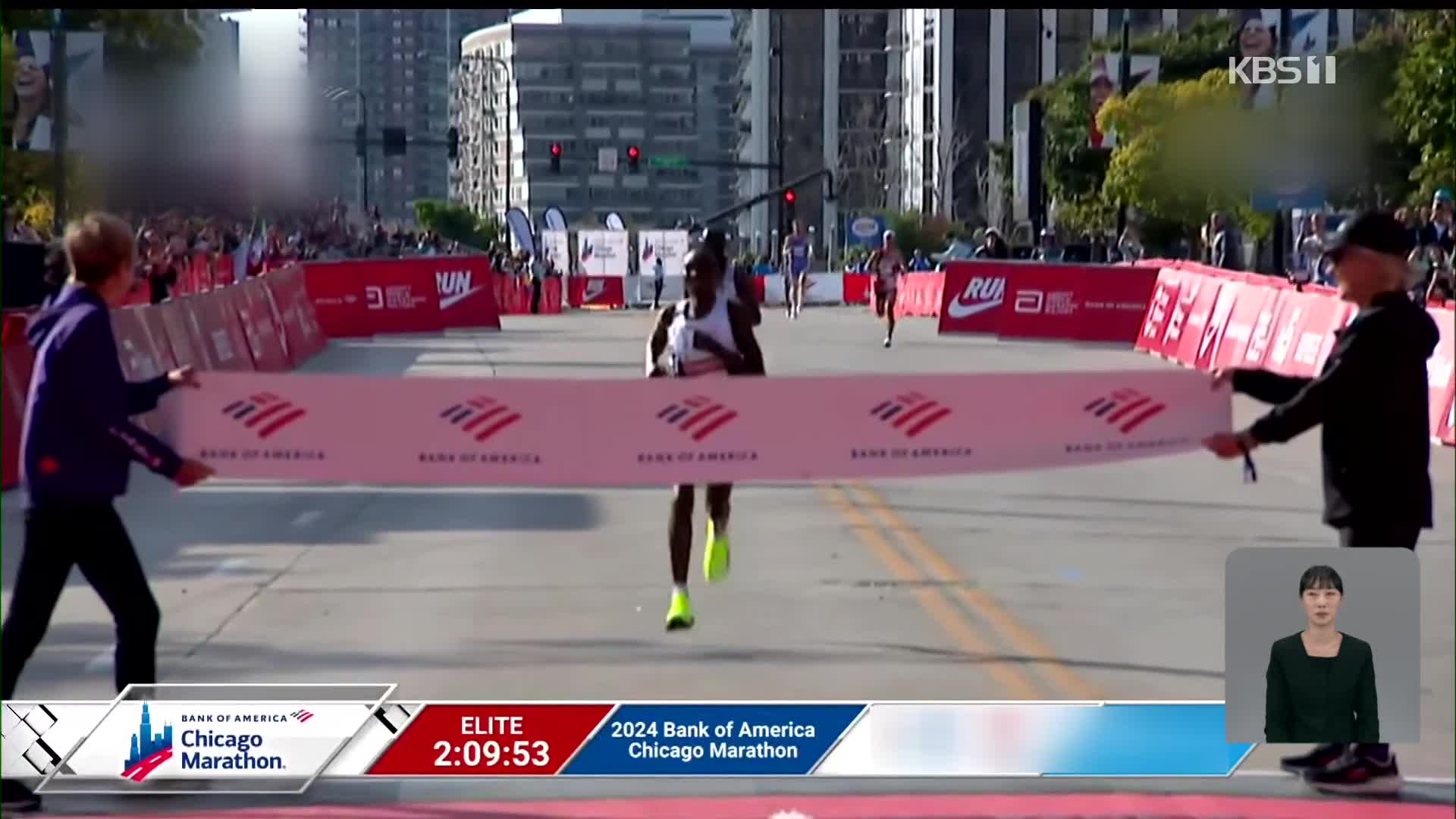Women's marathon finally breaks the ‘2 hours 10 minutes’ barrier: A victory of technological advancement?
입력 2024.10.15 (01:17)
읽어주기 기능은 크롬기반의
브라우저에서만 사용하실 수 있습니다.
[Anchor]
The seemingly impossible barrier of 2 hours and 10 minutes in women's marathon has finally been broken.
Kenya's Ruth Chepngetich's world record is being analyzed as a victory of sports technology advancement.
Reporter Moon Young-kyu has the story.
[Report]
Chepngetich, who took the lead early in the women's division, raced alongside male competitors.
As the historic record came into sight, Chepngetich accelerated even more in the final stretch.
With a time of 2 hours, 9 minutes, and 56 seconds, Chepngetich became the first athlete to break the 10-minute barrier in women's marathon.
After the race, Chepngetich dedicated her record to Kelvin Kiptum, the male marathon world record holder and her fellow Kenyan, who passed away earlier this year in an accident.
[Ruth Chepngetich/Kenyan Marathon Runner: "I dedicate my record to Kelvin Kiptum. The world record was my dream, and that dream has come true. I have fought for this."]
The British Telegraph described Chepngetich's victory as emerging from the "super-shoe wars," highlighting how much technological advancements have contributed to record-breaking performances.
In fact, the women's marathon world record had not been broken for 16 years since 2003, until a runner wearing advanced carbon-fiber plate shoes broke it in 2019, leading to a rapid reduction in records thereafter.
Amid the controversy of "technological doping," the World Athletics Federation has imposed restrictions on the number of carbon-fiber plates, but consistent technological advancements have continued within the regulations.
As these achievements culminate in Chepngetich's historic record, there is growing anticipation about whether the men's marathon can also break the 2-hour barrier.
This is KBS News, Moon Young-kyu.
The seemingly impossible barrier of 2 hours and 10 minutes in women's marathon has finally been broken.
Kenya's Ruth Chepngetich's world record is being analyzed as a victory of sports technology advancement.
Reporter Moon Young-kyu has the story.
[Report]
Chepngetich, who took the lead early in the women's division, raced alongside male competitors.
As the historic record came into sight, Chepngetich accelerated even more in the final stretch.
With a time of 2 hours, 9 minutes, and 56 seconds, Chepngetich became the first athlete to break the 10-minute barrier in women's marathon.
After the race, Chepngetich dedicated her record to Kelvin Kiptum, the male marathon world record holder and her fellow Kenyan, who passed away earlier this year in an accident.
[Ruth Chepngetich/Kenyan Marathon Runner: "I dedicate my record to Kelvin Kiptum. The world record was my dream, and that dream has come true. I have fought for this."]
The British Telegraph described Chepngetich's victory as emerging from the "super-shoe wars," highlighting how much technological advancements have contributed to record-breaking performances.
In fact, the women's marathon world record had not been broken for 16 years since 2003, until a runner wearing advanced carbon-fiber plate shoes broke it in 2019, leading to a rapid reduction in records thereafter.
Amid the controversy of "technological doping," the World Athletics Federation has imposed restrictions on the number of carbon-fiber plates, but consistent technological advancements have continued within the regulations.
As these achievements culminate in Chepngetich's historic record, there is growing anticipation about whether the men's marathon can also break the 2-hour barrier.
This is KBS News, Moon Young-kyu.
■ 제보하기
▷ 카카오톡 : 'KBS제보' 검색, 채널 추가
▷ 전화 : 02-781-1234, 4444
▷ 이메일 : kbs1234@kbs.co.kr
▷ 유튜브, 네이버, 카카오에서도 KBS뉴스를 구독해주세요!
- Women's marathon finally breaks the ‘2 hours 10 minutes’ barrier: A victory of technological advancement?
-
- 입력 2024-10-15 01:17:41

[Anchor]
The seemingly impossible barrier of 2 hours and 10 minutes in women's marathon has finally been broken.
Kenya's Ruth Chepngetich's world record is being analyzed as a victory of sports technology advancement.
Reporter Moon Young-kyu has the story.
[Report]
Chepngetich, who took the lead early in the women's division, raced alongside male competitors.
As the historic record came into sight, Chepngetich accelerated even more in the final stretch.
With a time of 2 hours, 9 minutes, and 56 seconds, Chepngetich became the first athlete to break the 10-minute barrier in women's marathon.
After the race, Chepngetich dedicated her record to Kelvin Kiptum, the male marathon world record holder and her fellow Kenyan, who passed away earlier this year in an accident.
[Ruth Chepngetich/Kenyan Marathon Runner: "I dedicate my record to Kelvin Kiptum. The world record was my dream, and that dream has come true. I have fought for this."]
The British Telegraph described Chepngetich's victory as emerging from the "super-shoe wars," highlighting how much technological advancements have contributed to record-breaking performances.
In fact, the women's marathon world record had not been broken for 16 years since 2003, until a runner wearing advanced carbon-fiber plate shoes broke it in 2019, leading to a rapid reduction in records thereafter.
Amid the controversy of "technological doping," the World Athletics Federation has imposed restrictions on the number of carbon-fiber plates, but consistent technological advancements have continued within the regulations.
As these achievements culminate in Chepngetich's historic record, there is growing anticipation about whether the men's marathon can also break the 2-hour barrier.
This is KBS News, Moon Young-kyu.
The seemingly impossible barrier of 2 hours and 10 minutes in women's marathon has finally been broken.
Kenya's Ruth Chepngetich's world record is being analyzed as a victory of sports technology advancement.
Reporter Moon Young-kyu has the story.
[Report]
Chepngetich, who took the lead early in the women's division, raced alongside male competitors.
As the historic record came into sight, Chepngetich accelerated even more in the final stretch.
With a time of 2 hours, 9 minutes, and 56 seconds, Chepngetich became the first athlete to break the 10-minute barrier in women's marathon.
After the race, Chepngetich dedicated her record to Kelvin Kiptum, the male marathon world record holder and her fellow Kenyan, who passed away earlier this year in an accident.
[Ruth Chepngetich/Kenyan Marathon Runner: "I dedicate my record to Kelvin Kiptum. The world record was my dream, and that dream has come true. I have fought for this."]
The British Telegraph described Chepngetich's victory as emerging from the "super-shoe wars," highlighting how much technological advancements have contributed to record-breaking performances.
In fact, the women's marathon world record had not been broken for 16 years since 2003, until a runner wearing advanced carbon-fiber plate shoes broke it in 2019, leading to a rapid reduction in records thereafter.
Amid the controversy of "technological doping," the World Athletics Federation has imposed restrictions on the number of carbon-fiber plates, but consistent technological advancements have continued within the regulations.
As these achievements culminate in Chepngetich's historic record, there is growing anticipation about whether the men's marathon can also break the 2-hour barrier.
This is KBS News, Moon Young-kyu.
-
-

문영규 기자 youngq@kbs.co.kr
문영규 기자의 기사 모음
-
이 기사가 좋으셨다면
-
좋아요
0
-
응원해요
0
-
후속 원해요
0










![[속보] 유네스코서 군함도 논의 무산…초유의 ‘한일’ 표 대결에서 패배](/data/layer/904/2025/07/20250707_pmGHJB.jpg)




이 기사에 대한 의견을 남겨주세요.